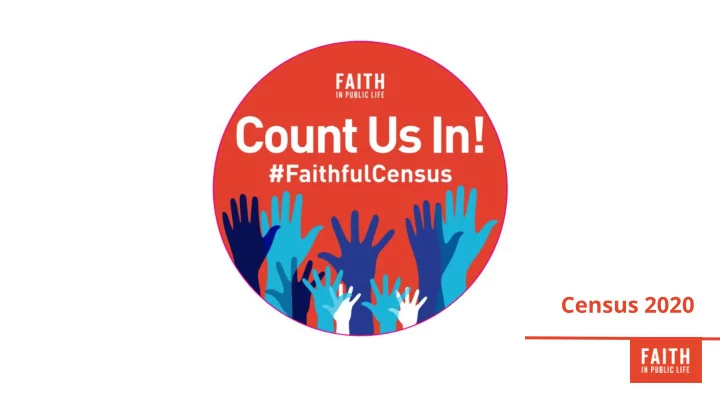

Census 2020
What is the Census? The Census is a constitutionally mandated count of all people residing in the US All people regardless of race, faith tradition, immigration status or economic status are counted The Census occurs every 10 years
What does the Census determine? Section 8 Housing Vouchers $800 Billion Free lunch Healthcare programs WIC in Federal Classroom Number of sizes hospital beds Funding Food Security SNAP Income security Head Start Annually Americorps Voting Access
What is at stake? Political Representation Census data is used to Redistribute seats in the House ● of Representative according to state population (change how many representatives a states has) Redraw congressional and ● legislative districts
We all count in the eyes of God. Let us count in the eyes of the government.
Who is undercounted in the Census? Historically, these communities have been undercounted: Renters ● African Americans, Asian ● Residents who live in ● Americans, Latinos and Native non-traditional housing Americans Rural residents ● Households with low incomes ● Highly mobile residents, such as ● Immigrants and individuals with ● farmworkers low English-language proficiency Very young children aged 0-4 ●
3,800,000 Latinos 3,700,000 African Americans 2,200,000 children Not counted in 2010
Who is counted? Every person living in the United States! Each person is counted where they are living on April 1, 2020 (whether they are direct family of the respondent or not) Including: Babies and children ● People in foster care ● People in incarceration ● Immigrants without legal status ● College and university students ● People nursing homes ●
When is the 2020 Census? March 2020 – Self-Response April 1, 2020 – Census Day March-April 2020 – Transitory and Group Residence Counts (hotels, colleges, campgrounds, shelters) May 2020 – In-person Interviews Summer 2020 – Census Ends December 2020 – Official count is submitted to Congress and White House
How You Will Respond to Census? Self-response Start March 2020, after receiving invitation by mail Online ● Over the phone ● Mailed paper form ● In-person Interviews if self-response is not submitted Census workers visit transitory housing ● *Only one person should (hotels, campgrounds, shelters) Start March 2020 complete the Census for the Census workers visit residences if no ● whole household. self-response is submitted Start May 2020
What will the Census ask? Selected example questions How many people are living or staying here on April 1, 2020? Do you own or rent your residence? Each person’s sex, age, date of birth, and race. Each person’s relation (spouse, sibling, roomate) to the respondent. https://www.census.gov/programs-surveys/decennial-census /technical-documentation/questionnaires/2020.html
Will it ask a question about citizenship? No. As a result of the June 27th Supreme Court ruling, there will be no citizenship question.
Is the Census confidential? Responses are secure and encrypted. Responses are not shared with other government agencies. Title 13 of the U.S. Code: census data can only be used for statistical purposes, meaning personal information cannot be used against respondents in court or by a government agency. Census Bureau staff who have access to Title 44 of the U.S. Code: Personal census personal information are sworn for life to information cannot be disclosed for 72 years. protect confidentiality. Penalty for wrongful disclosure is up to 5 years imprisonment and $250,000 fine.
The Census: From Exclusion to Equality Designed as a tally to distribute political power ● and public money unequally and unjustly: Counted every white person as a full ○ person Counted enslaved people of African ○ descent as ⅗ of a person Did not count Native Americans at all ○ We want to ensure that all people, regardless ● of race, age, or immigration status are counted so we have a fair and accurate count.
Why is this a faithful issue? Dignity We believe that all people, regardless of race, religion, or immigration status, are made in God’s image. Our God-given dignity demands recognition. What we declare when we answer Fear not is the most often repeated the Census is that we are here, and phrase in Hebrew and Christian we are part of “we the people” and scripture-- repeated 365 times. Do not we refuse to be excluded . be afraid to state your presence.
Why is this a faithful issue? Community You count in this country. Your work and your contribution to the common good and common ground, moves beyond the walls of where we worship. Your voice matters. Your We must work together and do communities, your schools, your everything in our power to make sure children need you to be counted to that everyone in our local receive the right economic communities are counted so we all can apportionment. get the resources we deserve.
Why is this a faithful issue? Democracy By completing the Census and encouraging our communities do so, we claim our rightful representation and fulfill our responsibility to our neighbors and future generations. The truth is that being counted As spiritual and moral people, to contributes to the strengthening of the participate in our democracy is to be democracy. If we are undercounted, counted. they are taking away our voices from our democracy and our rights.
Get involved!
Be a Faith Census Ambassador! Faith Census Ambassadors are trusted messengers in the community who help spread the message that the 2020 Census is just around the corner. When you sign up to be an ambassador, you'll work directly with Faith in Public Life to ensure your community has the information and resources it needs to be counted. Sign up at www.faithinpubliclife.org/census
Any questions? Census2020@FaithInPublicLife.org (202) 664-5882
Recommend
More recommend